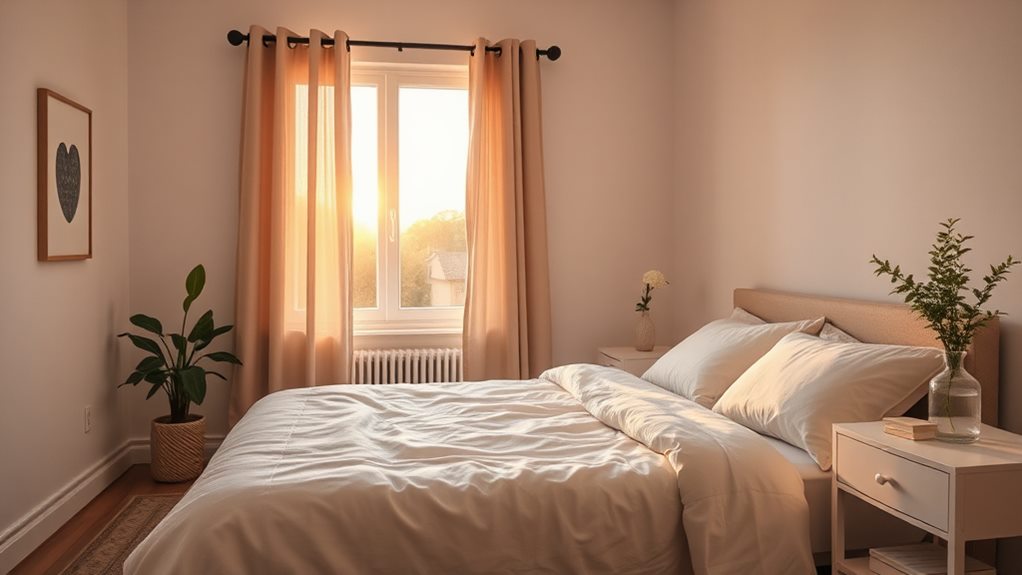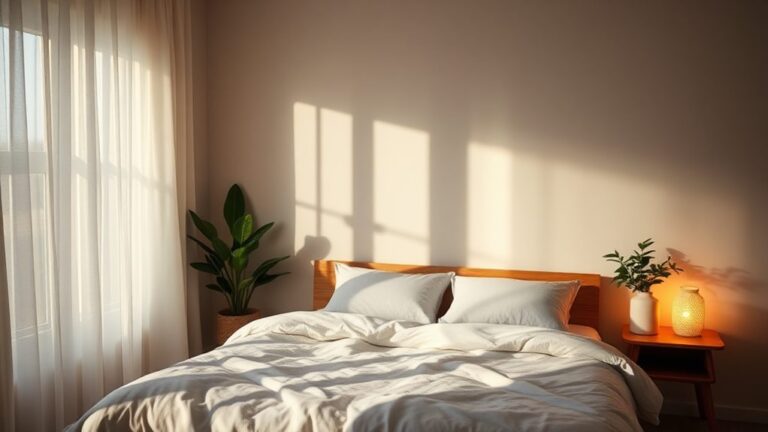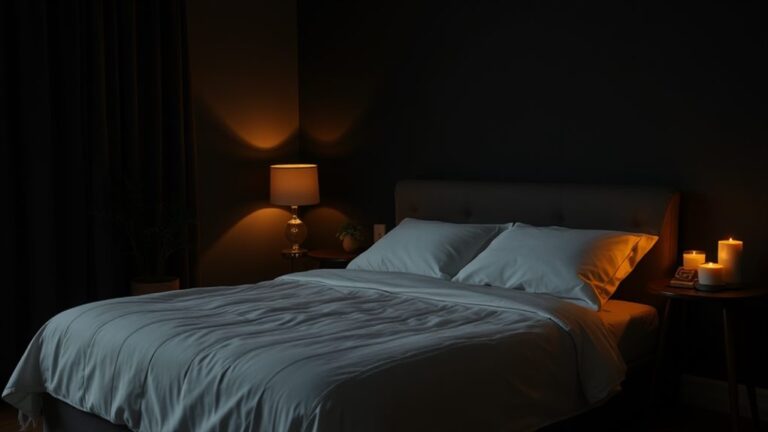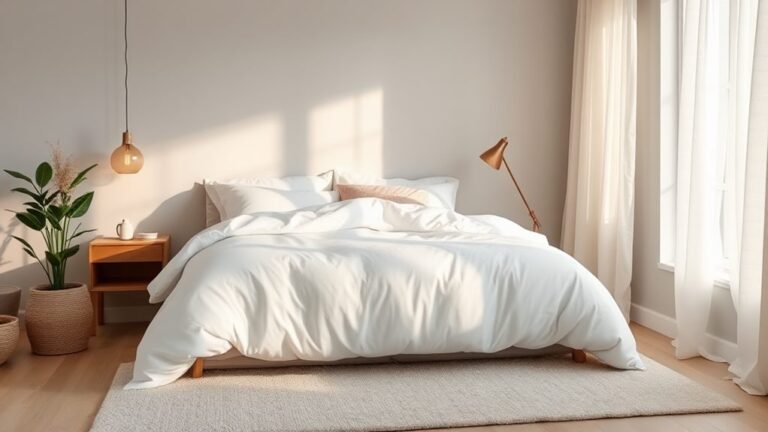You can reboot your disrupted sleep schedule by harnessing the power of nature and making a few simple tweaks to your daily routine. Start by regulating your body's circadian rhythms by exposing yourself to natural light and darkness at the right times. Establish a consistent sleep environment by ensuring darkness, quiet, and a comfortable temperature in your bedroom. Limit your exposure to screen time before bed to avoid suppressing melatonin production. By making these simple changes, you'll be on the path to restoring a healthy sleep schedule and improving your overall well-being, with even more effective strategies waiting to be explored.
Nightcap Notes
- Establish a consistent wake-up time and expose yourself to natural light to regulate your body's internal clock and circadian rhythms.
- Create a sleep-conducive atmosphere by ensuring darkness, quiet, and a comfortable temperature to promote relaxation and restful sleep.
- Limit exposure to screens and electronic devices in the evening to avoid blue light suppression of melatonin production and promote relaxation.
- Incorporate relaxation techniques, such as deep breathing exercises, progressive muscle relaxation, and mindfulness meditation, to calm the mind and body.
- Develop a morning routine that signals to the body that it's time to be awake, such as stretching, yoga, or a short walk, to boost energy levels.
Regulate Your Body's Circadian Rhythms
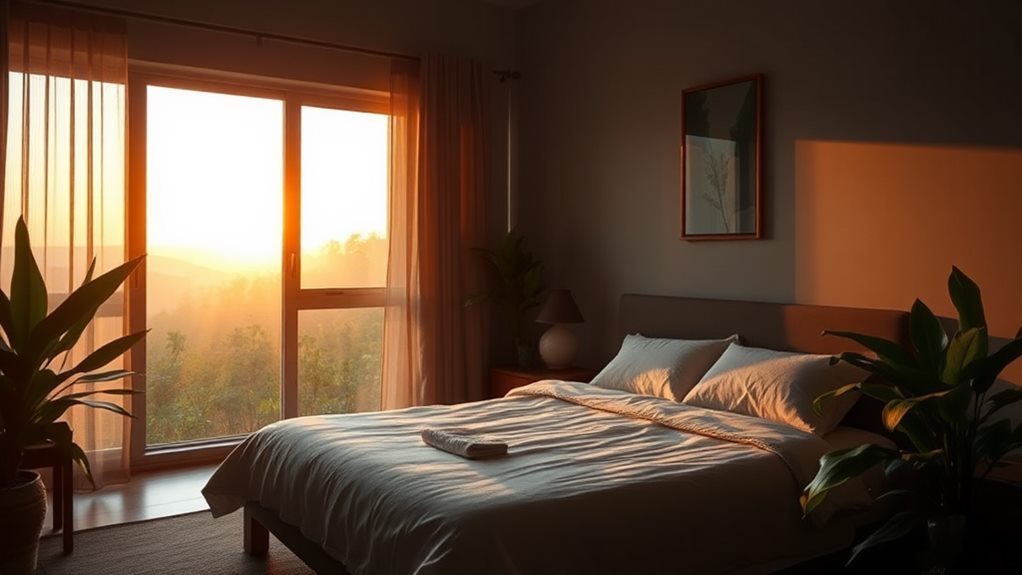
To regulate your body's circadian rhythms, you need to expose yourself to natural light and darkness at the right times.
You should get outside in the morning, as natural light exposure helps regulate your circadian rhythms, making you feel more alert and awake. You don't need to spend hours outside; even a short 10-15 minute walk in the morning will do.
In fact, incorporating a morning walk into your daily routine can be a great way to boost your mood and energy levels, and can even help you sleep better tonight with the right natural sleep remedies. A consistent wake-up time can also help signal to your body that it's time to be awake and alert.
In the evening, you need to limit your exposure to screens and electronic devices, as the blue light they emit can suppress melatonin production, making it harder to fall asleep.
You should also avoid stimulating activities in the evening, as they can interfere with your sleep. Instead, you can try relaxation techniques like meditation or deep breathing to calm your mind and body before sleep.
Establish a Consistent Sleep Environment
Regulating your body's circadian rhythms is just the first step in fixing your disrupted sleep schedule. To further solidify your sleep patterns, you need to establish a consistent sleep environment. This means creating a sleep-conducive atmosphere that signals to your brain that it's time to sleep.
| Sleep Environment Factors | Tips for Improvement |
|---|---|
| Darkness | Use blackout curtains or blinds to block out any light sources |
| Quiet | Invest in earplugs or a white noise machine to minimize noise disruptions |
| Temperature | Keep your bedroom at a cool temperature between 60-67°F (15-19°C) |
| Comfort | Choose a comfortable mattress and pillows to guarantee a restful night's sleep |
| Clutter-Free | Keep your bedroom tidy and clutter-free to promote relaxation
Limit Exposure to Screen Time
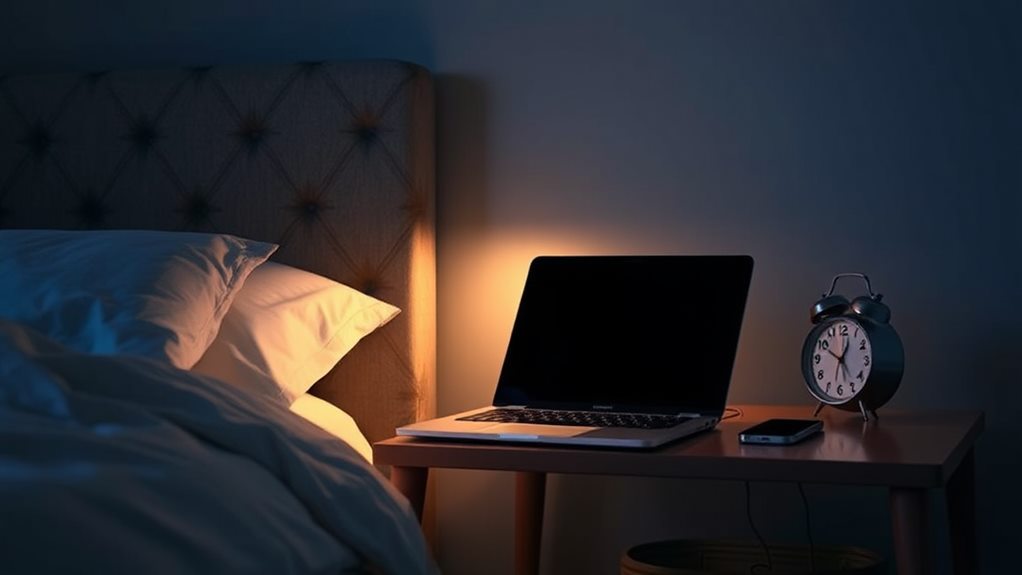
Your screen time habits can substantially impact the quality of your sleep.
When you spend time in front of screens, you're exposed to blue light, which your brain interprets as daylight. This tricks your brain into thinking it's still daytime, making it harder to fall asleep. Additionally, staring at screens before bed can stimulate your brain, making it harder to relax.
The effects of screen time on sleep are so significant that some experts consider it a major "sleep stealer" Screen Time Secrets. In fact, understanding the hidden sleep stealers can help you take control of your sleep schedule.
To limit your exposure to screen time, set a specific "no screen" time before bedtime. Try to avoid screens for at least an hour before bedtime or use blue light filtering glasses or apps that filter out blue light.
You can also set your devices to automatically switch to nighttime mode, reducing the amount of blue light emitted. By avoiding screens before bed, you'll help regulate your body's internal clock and improve the quality of your sleep.
Make screen-free time a priority before bed, and you'll be sleeping better in no time. Establish a pre-bedtime routine that doesn't involve screens, and you'll be on your way to a more restful night's sleep.
Incorporate Relaxation Techniques
Now that you've established a screen-free pre-bedtime routine, it's time to focus on calming your mind and body.
You can do this by incorporating relaxation techniques into your daily routine. One technique is deep breathing exercises. Lie down or sit comfortably, inhale deeply through your nose, hold your breath for a few seconds, and exhale slowly through your mouth. Repeat this process several times until you feel your muscles relax.
To further enhance your relaxation experience, consider investing in a comfortable mattress and cozy bedding from Sleep Better Tonight. A consistent sleep environment is also vital for a good night's sleep.
Another technique is progressive muscle relaxation. Tense and then relax different muscle groups in your body, starting with your toes and moving up to your head. This helps release physical tension and promotes relaxation.
You can also try mindfulness meditation, focusing on the present moment and letting go of thoughts and worries. Listen to calming music or nature sounds to create a peaceful atmosphere.
Develop a Morning Routine
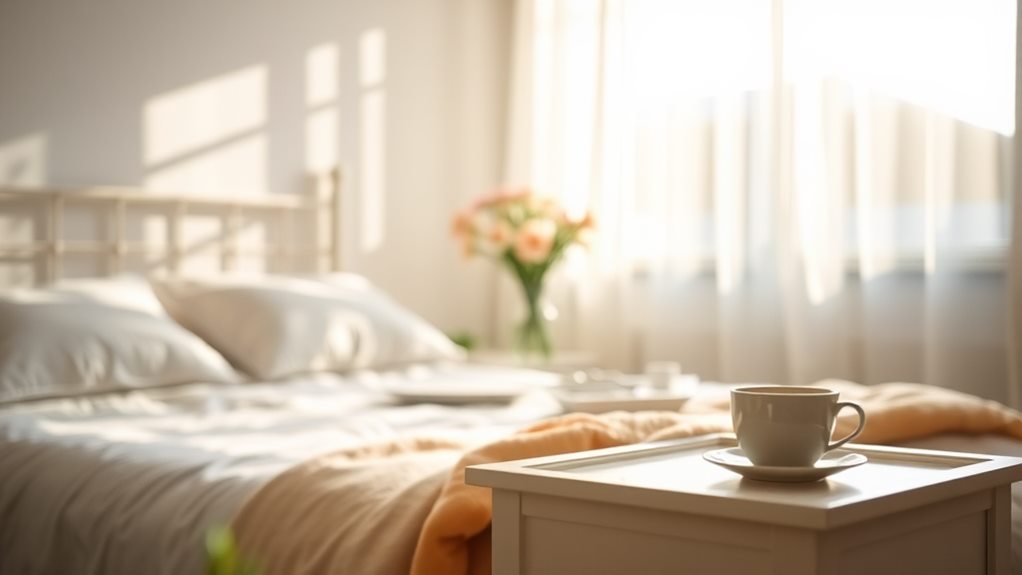
As you work on fixing your disrupted sleep schedule, establishing a consistent morning routine is essential.
You'll want to start by setting a specific wake-up time and sticking to it, even on weekends. Consistency will help regulate your body's internal clock, making it easier to wake up and fall asleep.
Next, create a calming and invigorating morning routine that signals to your body that it's time to be awake.
This can include activities like stretching, yoga, or a short walk. Exposing yourself to natural light will also help regulate your circadian rhythms, so try to get some sunlight as soon as you wake up.
Avoid starting your day with screens, as the blue light can be jarring and make it harder to wake up.
Instead, opt for a more gentle activity, like meditating, journaling, or reading. By starting your day with a consistent and calming routine, you'll be able to set a positive tone for the rest of the day and help your body adjust to a healthy sleep schedule.
This, in turn, will improve the quality of your sleep and overall well-being.
Adjust Your Meal Timing
Establishing a consistent morning routine helps regulate your body's internal clock, but that's only half the battle.
You also need to pay attention to your meal timing to get your sleep schedule back on track. When you eat can profoundly impact your body's natural rhythms, influencing your energy levels, digestion, and ultimately, your sleep.
Adjusting your meal timing can be as simple as eating breakfast at the same time every day and spacing out your meals to maintain a consistent energy flow.
Aim to finish eating dinner at least 2-3 hours before bedtime to allow for proper digestion and reduce the risk of discomfort or indigestion during the night. Additionally, avoid heavy meals close to bedtime, as they can cause a spike in blood sugar and insulin levels, making it harder to fall asleep.
Frequently Asked Questions
How Long Does It Take to Adjust to a New Sleep Schedule?
You're wondering how long it takes to adjust to a new sleep schedule.
The good news is that your body can adapt relatively quickly. Within a few days to a week, you'll start to feel more alert at your new wake-up time.
As you stick to your schedule, your body's internal clock will reset, and you'll begin to feel more rested and refreshed. Consistency is key, so keep at it!
Can a Disrupted Sleep Schedule Affect Mental Health?
"You can't pour from an empty cup," and a disrupted sleep schedule can be a significant drain on your mental health.
When you're not getting quality rest, you're more likely to feel anxious, irritable, and depressed.
Your mood, cognitive function, and emotional regulation all take a hit.
You'll struggle to focus, make decisions, and cope with stress.
Crucial to prioritize sleep to protect your mental well-being and get your life back on track.
Is It Possible to Fix a Disrupted Sleep Schedule Without Supplements?
You're wondering if you can fix a disrupted sleep schedule without supplements.
The answer is yes, you can. By making a few simple changes to your daily routine, you'll be sleeping like a baby in no time.
You'll start by setting a consistent sleep schedule and creating a relaxing bedtime routine.
You'll also want to get some morning sunlight to regulate your circadian rhythms.
Before long, your body will be back on track.
Can Certain Foods Help Regulate a Disrupted Sleep Schedule?
You're wondering if food can help regulate your sleep schedule.
Yes, it can! You'll want to focus on consuming foods that promote melatonin production, like cherries, walnuts, and bananas.
Avoid heavy meals close to bedtime, but a light snack of sleep-inducing foods can help.
You're also more likely to fall asleep faster if you drink warm milk or herbal tea, like chamomile or lavender, before bed.
What Role Does Exercise Play in Fixing a Disrupted Sleep Schedule?
You're probably thinking, 'Exercise? Isn't that just a way to tire myself out even more?'
Ironically, it's quite the opposite. Regular physical activity can actually help regulate your sleep schedule.
By exercising, you're stimulating your body's natural sleep-wake cycle.
Just be sure to time it right – avoid vigorous workouts within a few hours of bedtime, as they can actually interfere with sleep.
Instead, opt for relaxing activities like yoga or walking.
Conclusion
You've done it – you've taken the first steps towards reclaiming your sleep schedule! By regulating your circadian rhythms, creating a sleep-conducive environment, and cutting back on screen time, you're fundamentally giving your body a brand-new sleep overhaul. And trust me, the results will be astronomical – you'll be sleeping like a baby in no time, and your mornings will be so bright, you'll need shades. Stick to it, and get ready to wake up feeling like a million bucks!

